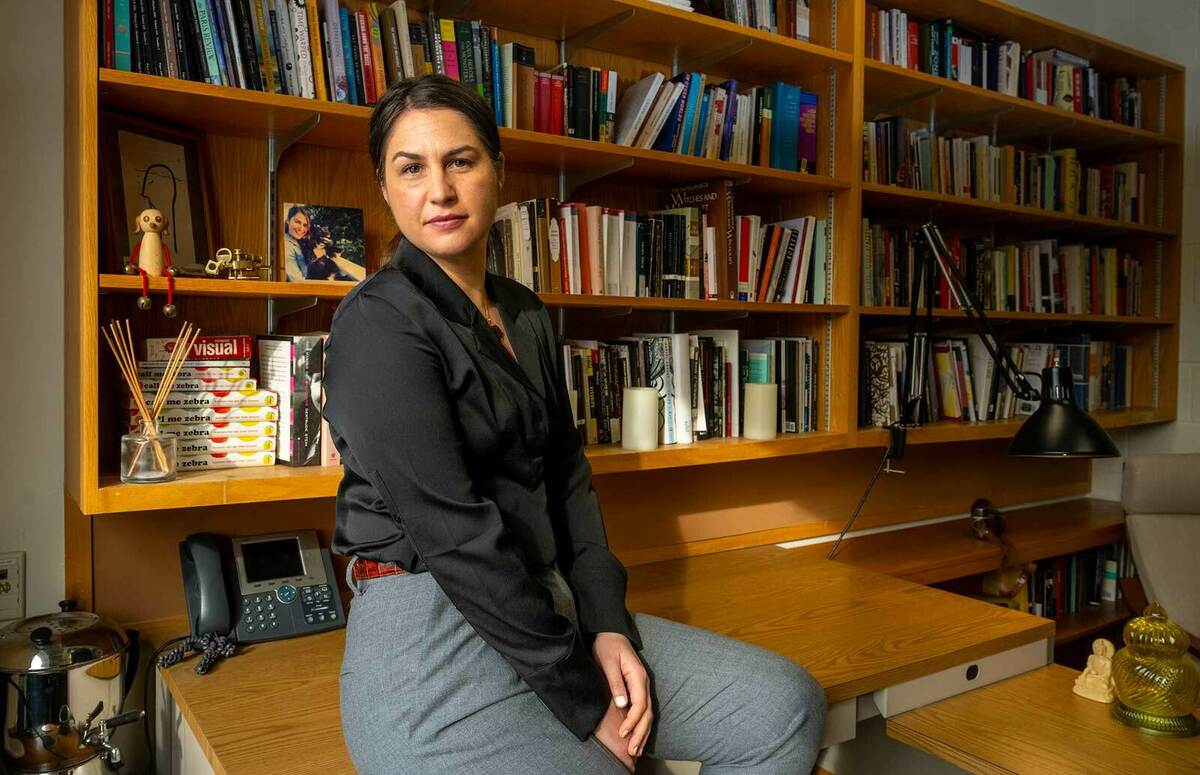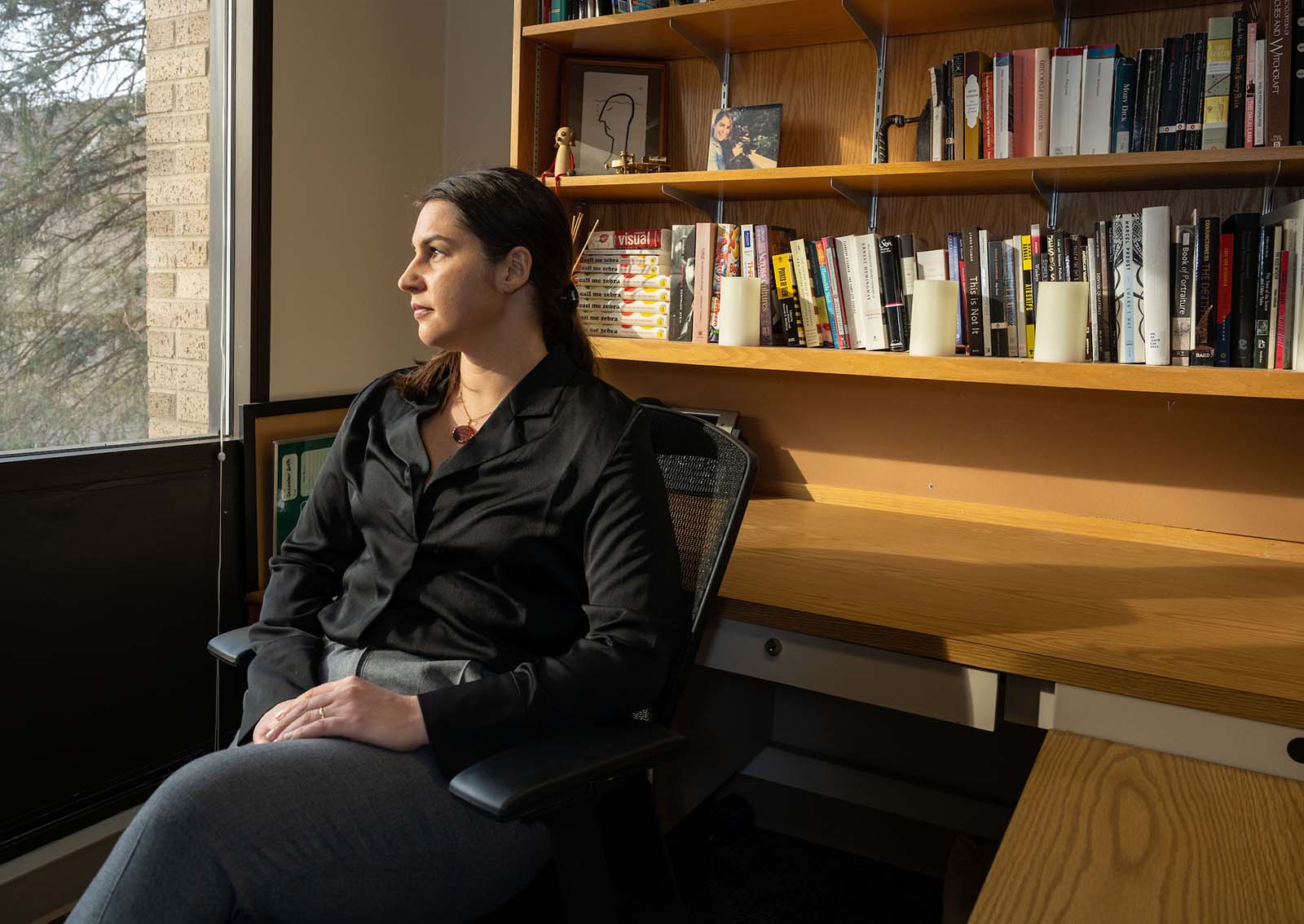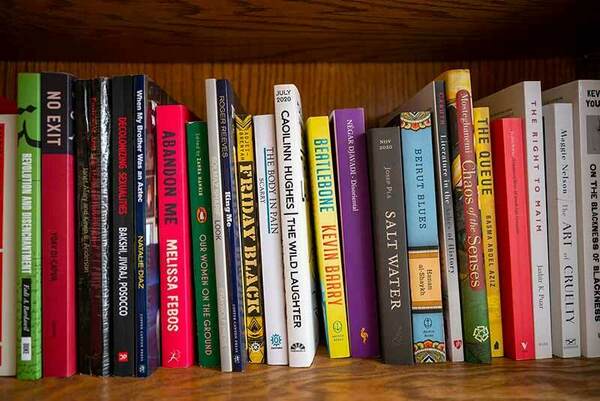
Stories That Shape Identity
Azareen Van der Vliet Oloomi
College of Arts and Letters
On the pages of her novels, Azareen Van der Vliet Oloomi creates female characters who insist on being themselves. That’s something the award-winning writer and Notre Dame faculty member knows quite a bit about.
Growing up in Iran — a country where laws restricted her mobility because of her gender — she loved marching by herself through a deep eucalyptus forest to go to the beach on the Caspian Sea.
“I have a very adventurous spirit,” said Van der Vliet Oloomi, an associate professor of English and the MFA in Creative Writing Program. “I write female characters who are equally themselves. They insist on being who they are in the world.”
“It requires a lot of courage to show up every day for the writing. The page is like a mirror — you have to constantly examine yourself.”
Like many of her characters, Van der Vliet Oloomi is rarely in the same place for very long. Born in the United States to an Iranian mother and British father, she moved a lot during the first two decades of her life because of personal, familial and political reasons.
Now, she travels in order to get a deep sensory experience of the landscapes that she writes about — including the flora, fauna and food. Or she travels to talk about her writing, including the novel “Call Me Zebra,” for which she won the 2019 PEN/Faulkner Award for Fiction, the most prestigious annual literary prize in America.
Since August, she’s been on tour promoting her latest creation, “Savage Tongues.” Reviewers describe the book as compulsive, unsettling, bravely observed, haunting and healing. It’s an honest, intimate look at love, transforming cruelty into love, the power of female friendships, and who people are taught to love and hate.
It centers on Arezu, a 37-year-old Muslim Iranian British American, and Ellie, a queer scholar and lapsed Orthodox Jew, who take a pilgrimage to Spain to excavate traumatic memories.

“They both have hybrid identities, and they’re both deeply dispossessed from their families of origin because they don’t prescribe to the constructs of femininity their families wanted them to abide by,” she said. “Their friendship is a place of refuge.”
While “Savage Tongues” can be difficult to talk about due to the sexual violence it details, Van der Vliet Oloomi has found it resonates with women despite, or perhaps because of, its challenges.
“My books aren’t easy. If I ask readers to work hard, then I have to work just as hard, if not harder,” she said. “It requires a lot of courage to show up every day for the writing. The page is like a mirror — you have to constantly examine yourself.”
The Journey of Exile
Given her background and all that she’s achieved — a Whiting Writers’ Award, a National Book Foundation “5 Under 35” selection and a Fulbright Fellowship — Van der Vliet Oloomi is keenly aware of the opportunity she has to be a leader in the classroom and in her field.
“There are a lot of blind spots when it comes to understanding the true costs of displacement, but at Notre Dame, there’s also goodwill to want to understand the lived experiences of others.”
“It’s important for students and young people to see models of women of color or ethnic and religious minoritized women,” she said. “Leading and being able to not just execute a vision but create space for our students of color, our female students, our LGBTQ students — those are things that motivate me to do the work.”
Van der Vliet Oloomi embraces her ability to reaffirm a plurality of perspectives through her courses on violence and migration and the history of walking and pilgrimage — and especially through Literatures of Annihilation, Exile, and Resistance, an interdisciplinary research collective and lecture series that she launched at Notre Dame in 2020.
The collective explores contemporary literature, film and visual art that is “shaped by revolutionary and resistance movements, decolonization, migration, class and economic warfare, communal and state-sanctioned violence, and human rights violations.” It amplifies the voices of Middle Eastern/Southwest Asian and North African people whose lived experiences forge alliances across formal, linguistic and national boundaries.
The collective, co-sponsored by the College of Arts and Letters and the Kroc Institute for International Peace Studies and housed at the Initiative on Race and Resilience, has hosted 15 conversations with fiction writers, filmmakers and poets. Its next virtual event features authors Zeyn Joukhadar, Randa Jarrar and Mejdulene B. Shomali
“Writing about exile is a constant reminder both of the loneliness of exile and its tremendous transformative potential,” she said. “There are a lot of blind spots when it comes to understanding the true costs of displacement, but at Notre Dame, there’s also goodwill to want to understand the lived experiences of others.”
Fearless and Loving at the Same Time
There’s an interactive map on the collective’s website that traces the personal migration routes of its collaborators and guests. Van der Vliet Oloomi’s own paths crisscross the globe — California, Scotland, Spain, United Arab Emirates, Iran, Nevada, New York, Rhode Island, England, Indiana — forming a visual representation of why she has a sense of being from nowhere and everywhere.
When her parents split up, she lived in Tehran with her mother and grandmother from age 7 to 12. She was about 13 when she returned to the U.S. and, after years of speaking Farsi and Spanish, became reacquainted with English — and discovered how elastic its simple grammatical structure can be.
“One of the things that’s really fun for me as a writer is doing those acrobatics within English,” she said. “Expanding it and pushing it to its limits so that I can give expression to these thoughts and feelings that I would normally articulate in Farsi or in Spanish.”
For Van der Vliet Oloomi, language shapes identity. As a writer, she both shapes language and listens to it, to see where it takes her and what it reveals to her.
Knowing so many languages (she now also speaks Italian) has led her to feel like a “linguistic commuter.”


“The musicality of language mirrors the landscape of a place, and its food and culture. It’s organic to the space or region,” she said. “I’ve cultivated appreciation for that. I think about language as something that’s alive, that has its own consciousness.”
Living in myriad places can lead to a complicated sense of identity — but for Van der Vliet Oloomi, like for her characters, it’s taught her to insist on being herself.
“Your body is your home, your psyche is your home,” she said. “I became self-reliant and learned to be assertive even when I was out of my depth — to be fearless and loving at the same time.”
